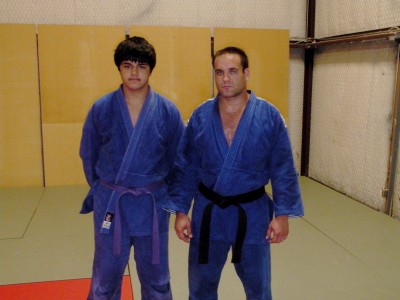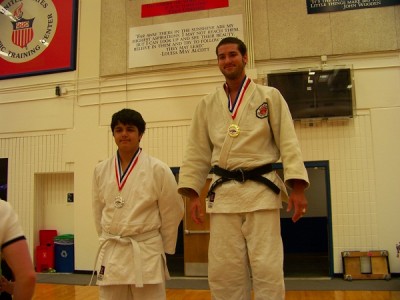Superlatives have been bandied about way too much these last few years. We used to reserve terms like “great,” “best,” and “elite” for truly rare, truly spectacular moments or performances. Now, everything is great. Or it’s the Best. Post. Ever. And elite…hell, we all know what happened with that one.
Let’s get the bad news out of the way first. You are not elite. That’s fine. I’m not either. We do the best with what we have. But there are a few among us who have the genetics, mental focus, ambition, support, and luck to make it to the top.
I would like you to meet a friend and teammate of mine who may one day join the elites. His name is Devin. He has already won nine junior national championships in judo (there are three each year). He is 6’2” tall and weighs 210 pounds. He is twelve years old.

I am not one to pimp child athletes. Kids are usually too young and too immature to handle the scrutiny they get. I make an exception in this case because Devin is well-adjusted, has good family support, lives in Wichita Falls (where there aren’t many distractions), and plays judo (a sport nobody really gives a damn about).
The physical gifts are obvious. And because he is so big, he has been able to train with adult players the last few years. As a result, he has acquired some “game” from each weight class he passed through on the way up. He is a 200-pounder that throws stuff normally seen on the 66kg mat.
Mental focus and ambition go hand in hand. Judo is about mat hours and competition. The training is fun because we have a good club. State and regional tournaments are fun because we take a good size group. That’s easy. It gets harder at the national level, where it’s just the kid, the parents, and the coach. At the international level, it’s the kid and whatever coach is assigned to that squad (not always your personal coach). Beyond that, it’s spending every weekend on the road, sleeping in cars or hotels, and fighting in every gym in North America.
A typical match for Devin against an older opponent
There is a social cost to be paid as one advances in an individual sport such as this. Luckily Devin trains with several older junior athletes who are already on that path. He also got to spend some time with Ronda Rousey (2-time Olympian, Bronze in Bejing ’08, Silver in Worlds ’07), who talked a bit about her life as an elite judoka. He has time to be a kid now, but that free time will quickly vanish as he continues to pursue an Olympic dream.

Support is key to succeeding in judo or any other sport. He has great family support (meaning parents, not judo parents). He has a good local club. And he has friends when he wants to cut loose.
And then there is luck. In our club, there is a core group of adult players who have been competing, training, and teaching with each other for several years. These guys have all been able to train with and teach Devin SAFELY. As fortune would have it, we are all in different weight classes. So Devin has basically spent 6-9 months learning the habits and techniques particular to each weight class. As I mentioned, as he moves through weight classes, he retains some of the “game” from each. This kinda sucks for me, since I’m just now getting him. It’s like fighting Duncan McLeod.
Devin throwing me with his favorite technique, harai goshi
The coach is the most crucial piece here. Roy Hash has been Devin’s coach since he started judo five years ago. He makes the decisions of how to push, when to push, when to let Devin fight up a weight or age class, when to fight in senior tournaments, and when to put the brakes on. It is a delicate balancing act that can make or break a player.
So, with all the pieces in place, how does he train? He spends two (sometimes three) days a week in class with the Texoma Judo Jujitsu Club. He spends another evening a week training with a club in Dallas that has several older nationally ranked junior players (this was Roy’s recommendation, which is rare in the coaching world). He supplements with the occasional camp, including a recent one he was invited to at the Olympic Training Center.
He trains two days at the gym (he recently started linear progression with Justin and is currently squatting 205x5x3, benching 130x5x3, and deadlifting 205x5x1). He also does 2-3 sessions a week of running and cardio with his mother. This will change some as he hits puberty (kids are not suited for anaerobic training) and when his matches start lasting more than a few seconds.
I spend one day a week with him working on throwing combinations and groundwork. By the time he is fourteen, I will no longer be able to handle him. And I’m ok with that.
Demonstrating a few throws
The bottom line is that, to be elite, you have to have the right gifts and be in the right circumstances. Devin is a good kid with immense physical gifts, talent, and interest in judo. He has a good group of coaches, parents, training partners, and friends around him. If everything stays on course, he could make a run for the rings in next decade or so.
But right now, he is twelve. The best anyone can do for him (or any other kid) is to encourage him and cultivate whatever talent he has. Me? I’ll be slamming him into the mat for the next year or so…just in case.
You Are Not a Beautiful and Unique Snowflake
15
